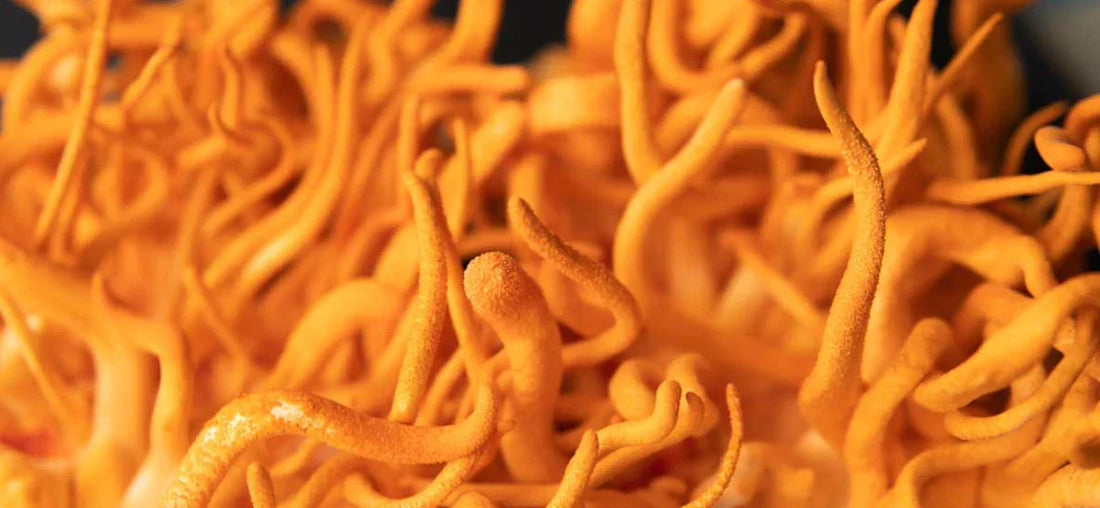
What Is Cordyceps and Can It Help With Exercise Performance?
Share
What’s Cordyceps Extract?
So, you’ve probably heard of cordyceps. It’s this crazy type of fungus that people have been using in traditional medicine for ages. There are a couple of types, but the main one people use is Cordyceps sinensis.

These days, you’ll find it in supplements—capsules, powders, teas, you name it. People usually take it for extra energy, mental focus, and just to help them push through their workouts.
What Are the Benefits of Taking Cordyceps?
Exercise
One of the biggest reasons people swear by cordyceps is for exercise. It’s been shown to help your body use oxygen more efficiently, which, in turn, makes you less out of breath during a workout. In one study, people who took 4 grams of cordyceps every day for three weeks could work out for longer and didn’t get winded as quickly.
Another study found their VO₂ max (basically how much oxygen your body can use during exercise) went up by 7% after six weeks. It’s not a massive increase, but when you’re pushing your limits, little improvements can make a big difference.
Does It Boost Testosterone?
Some animal studies suggest that cordyceps might help increase testosterone levels, which could lead to better muscle growth or even a higher sex drive. But there isn’t much concrete human research yet—so don’t go thinking it’s the next miracle supplement just yet.
Aging and Skin
Cordyceps is packed with antioxidants, which are great for fighting cell damage. There’s also some research showing it can help with collagen production, which helps keep your
skin looking fresh and plump.
So, yeah, it could have anti-aging effects, but it’s still early days in terms of human studies.
Cancer
Lab studies show cordyceps might slow down the growth of some cancer cells. But, and this is important, we’re talking about animal research here—so don’t take that as a sure
thing for humans just yet. The early signs look promising though, and more research is on the way.
Diabetes and Cholesterol
Cordyceps may help with blood sugar control and improve insulin sensitivity. It could also help lower LDL (“bad”) cholesterol and triglycerides. Again, these results mostly come from animal studies, so we need more human research to really know how effective it is.
Heart Health
Cordyceps might support your heart by improving how your body uses oxygen, which could lead to better blood circulation. It might also help lower blood lipids (fat in the blood) and reduce inflammation in the heart.
Inflammation
If you’ve been hitting the gym hard, cordyceps could help with muscle soreness. It has anti-inflammatory effects that might help your body recover faster after tough workouts,
leaving you less sore the next day.
Are There Any Side Effects?
Most people don’t experience any serious side effects from cordyceps. But there are a few things to watch out for:
- Nausea
- Stomach upset
- Diarrhoea (it’s always fun to add the “extra” vowels)
- Dry mouth
If you’re on blood thinners or have any autoimmune issues, it’s probably a good idea to chat with a doctor before trying it.
How to Pick a Good Cordyceps Supplement
Here’s what you should look for in a good cordyceps supplement:
- Clear labelling (make sure it lists the type of cordyceps used)
- Accurate dosage info
- Third-party testing or quality certification (so you know you’re not getting ripped off)
Try to avoid anything that just says “proprietary blend”—it’s usually just a way for companies to hide the actual amounts.
When and How to Take It
The typical dose is around 3 to 6 grams per day. Take it consistently for a few weeks if you want to start seeing results. You can take it:
- In the morning for an energy boost
- Before your workout for better endurance
- After training for faster recovery
If you don’t like swallowing pills, it mixes pretty easily into smoothies or coffee.
TL;DR
- Cordyceps can help with endurance and recovery during workouts
- It may help with testosterone, skin health, and overall fitness
- Side effects are rare but include nausea and stomach upset
- Pick a supplement that’s tested and has clear ingredients
- Take it regularly for the best results
Have you ever tried cordyceps? What was your experience? Does it really work, or is it just all hype?
